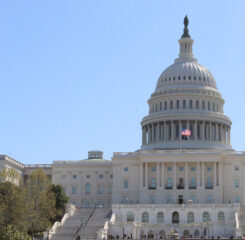House, Senate Agree to Final FY21 HUD Funding
The agreed-upon but not quite signed-into-law $2.3 trillion COVID-19 relief and FY21 omnibus spending bill includes the final fiscal year 2021 HUD spending bill. Overall, the bill provides a total of $49.6 billion for HUD, $561 million above the 2020 enacted level and $12.4 billion above the President’s budget request. Within it, Congress provides funding for new Section 202 housing, for new Service Coordinators, for a two-year extension of HUD’s IWISH demonstration, and a revival of an intergenerational housing set-aside within the Section 202 account. The bill would also fully fund the renewal of all expiring Section 8 Project-Based Rental Assistance contracts and Project Rental Assistance Contracts.
The FY21 HUD appropriations bill provides $855 million for the Section 202 Housing for the Elderly Account, $62 million more than FY20’s $793 million. This is an 8% increase for the Section 202 account over FY20 funding. The increase will renew all Section 202 PRAC contracts and provide $52 million for new Section 202 homes. While LeadingAge will continued to push for additional funds, the dearth of affordable housing for older adults is severe and we welcome the bill’s $52 million and will urge HUD to release these funds as quickly as possible. HUD is currently in the process of releasing about $196 million in new Section 202 funds appropriated by Congress but not yet released, a delay which has frustrated LeadingAge and other affordable senior housing stakeholders. The final bill directs HUD “to make all remaining funding provided in fiscal years 2018, 2019, and 2020 available not later than 100 days after enactment of this Act, and to award that funding not later than 220 days after enactment of this Act.”
For Service Coordinators, LeadingAge urged $75 million for new Service Coordinators to address the fact that only half of HUD-assisted affordable housing communities have a Service Coordinator. The bill fully renews grant-based Service Coordinators (estimated at $95 million, according to HUD’s budget request for FY21) and provides an additional $30 million for new Service Coordinators. This amount could result in about 125 new, grant-funded Service Coordinators. The bill requires HUD “to implement the following recommendations from the GAO report regarding section 202 properties employing service coordinators: (1) continue to improve the accuracy of the Department’s data on section 202 properties with service coordination; (2) develop and make available written guidance on assessing compliance with supportive services requirements; and (3) develop and implement procedures for verifying and analyzing performance data.” The 2016 GAO report urged HUD to do more to oversee efforts to link residents to services and specifically focused on the role of Service Coordinators.
The bill also includes $5 million for intergenerational housing as authorized by the Living Equitably—Grandparents Aiding Children and Youth (LEGACY) Act. The LEGACY Act was enacted in 2003 to authorize a set-aside within the Section 202 account for intergenerational housing. As was in 2003, the LEGACY Act is supported by LeadingAge. HUD did not announce its $3.96 million funding competition for LEGACY Act communities until 2006 and then did not announce the only two HUD-funded LEGACY site awardees until 2008, one in Florida and one in Tennessee.
The bill includes $13.5 billion for Section 8 Project-Based Rental Assistance, a $1 billion increase over FY20 funding for this account which has absorbed the rental assistance costs of former public housing and other smaller programs as they convert to the PBRA platform through the Rental Assistance Demonstration. The account also includes $350 million for Performance-Based Contract Administrators.
Unfortunately, the bill final bill does not include the Senate HUD bill’s two RAD for PRAC provisions. One of those provisions would have expanded the Rental Assistance Demonstration to include Section 202 Senior Preservation Assistance Contracts. The other provision would have exempted properties converting on a budget-neutral basis from Section 202 PRACs and Section 202 SPRACs (if authorized, see next sentence) from initial rent setting provisions of the Section 8 statute in order to continue critical services for older adults and prevent a reduction of project funding.
The bill includes $227 million for Section 811 Housing for Persons with Disabilities program, including up to $54,000,000 for new project rental assistance and capital advance awards. The bill requires HUD to prioritize projects targeting individuals with intellectual and developmental disabilities who have been receiving care through family members when awarding the new project rental assistance funds.
For the nation’s Housing Choice Voucher program, the bill provides $25.8 billion, a $1.9 billion increase from FY20. For the first time in almost 20 years, the HUD funding bill provides $43 million for new, incremental vouchers for homeless individuals and families. For public housing, where 35% of the nation’s 975,000 units are senior housing, the bill consolidates the public housing operating fund and public housing capital fund accounts into a single public housing fund and provides $7.8 billion for this fund.
The bill includes $20 million for an eviction prevention demonstration program and directs HUD to report back to appropriators on the feasibility of establishing and maintaining an evictions database.

Most Recommended
July 01, 2025
 Budget Reconciliation 2025
Budget Reconciliation 2025
June 27, 2025
Pathways for Foreign-Born Workers
Recently Added
July 02, 2025
 Analysis: Home Health CY 2026 Prospective Payment Rule
Analysis: Home Health CY 2026 Prospective Payment Rule
July 01, 2025



